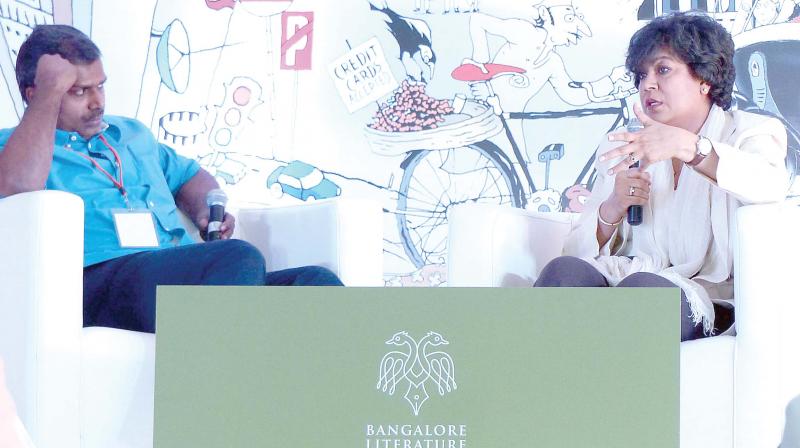Rajiv Gandhi's assassination: The end of Camelot
The Assassination of Rajiv Gandhi, describes, in chilling detail, the events leading to the death of the man she calls “India's JFK.â€

Bengaluru: “We journalists have an overwhelming sense of self-importance,” joked journalist Josy Joseph, as he opened the panel, Rajiv Gandhi: Chronicle of a Death Foretold, at the Bangalore Literature Festival on Sunday. He was in conversation with Neena Gopal, Resident Editor, Deccan Chronicle, whose book, The Assassination of Rajiv Gandhi, describes, in chilling detail, the events leading to the death of the man she calls “India’s JFK.”
Still, as the conversation progressed, it seemed as if that “sense of self importance” was justified after all. Ripples of ‘ooohs’ and ‘aaahs’ ran through the audience – one gentleman sat with his head in his hands – as Mrs Gopal described her final, almost prophetic interview with Rajiv Gandhi, just minutes before his assassination. It was an event that had, in a sense, already been surmised by top intelligence operatives across the country. “Still, they took away his Z security,” she said, in a tone of disbelief.
“I had been trying to get in touch with Rajiv Gandhi for some time and on May 20, I finally heard from Mani Shankar Aiyar, who told me Gandhi would be in town,” said Mrs. Gopal, who had had an interview scheduled with former Tamil Nadu CM Jayalalithaa on that very day. “Opinion polls had predicted that the Congress was making a comeback and it was for purely selfish reasons, really, that I chose to meet Rajiv Gandhi after all,” she said.
It was a strange experience, Mrs Gopal said thoughtfully, for the setup in Tamil Nadu was markedly different from the one she had witnessed in Kalwakurthy, Andhra Pradesh. “I barely exchanged two words with him then, security was so tight,” she recalled. She was summoned to Rajiv Gandhi's Ambassador on the way to Sriperumbudur, by his bodyguard, who would soon die beside him.
“I sat wedged in near the gear shift, between the driver and Rajiv Gandhi,” she said. “This rally was very interesting – the car was going very slowly and he was lit up for everybody to see. You had people pinching his cheeks and pulling at his angavastram,” Mrs. Gopal said. They travelled through the villages to Sriperumbudur to a chorus of ‘Rajiv Gandhi vazhge’, which she said, “Pleased him a great deal.”
It was perhaps minutes before his death when she asked him if he thought his life was at stake. "Have you noticed," he said, "That every single south Asian leader of any import gets assassinated?' Ten minutes later, he was gone!" She even pointed out that this was an unconventional setup – “He turned to Margatham Chandrashekhar and said, 'Where are the lights, where are the Congress workers?”
Rajiv Gandhi stepped out into a veritable sea of people, while Mrs Gopal hung back to speak with his press advisor. "He took two steps, three steps forward and that was it. There was a blinding flash of light, the heat was so immense that it singed our skin. The white saree I was wearing was covered in blood and gore and I was the last man standing, really."
Everything afterwards happened in a whirlwind of confusion and terror, as Mrs. Gopal stood there, with nothing but her notebook, tape recorder and pencil (her handbag had been forgotten in the rush). “The bomb had gone off, everyone was flat. There were people wailing and dying before me. People stepped over dead bodies as they rushed to the main road, Vazhapaddy Ramamurthy, the Congress Chief at the time came running up to the spot, as did Jayanti Natarajan."
All that was left of Rajiv Gandhi, she said, were his Lotto shoes and his Gucci watch. “They tried to lift his body, but only the shell remained. It was one of the most frightening moments of my life.”
In another ironic turn of events, the LTTE safehouse, she said, was one road away from her house in Indiranagar. “I pass by it every day. They picked their safehouses well – even the assassins were hidden away in an unused petrol tank without the knowledge of the police.”
In the end, it was the woman whose house had been given to the LTTE by her husband who finally told the cops. “They sent uniformed men to watch it, giving the game away. If they had been careful, the assassins might have been taken alive. And who knows what secrets could have been uncovered.”

